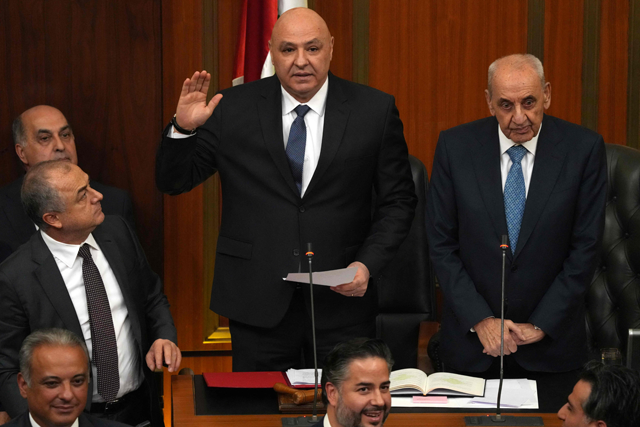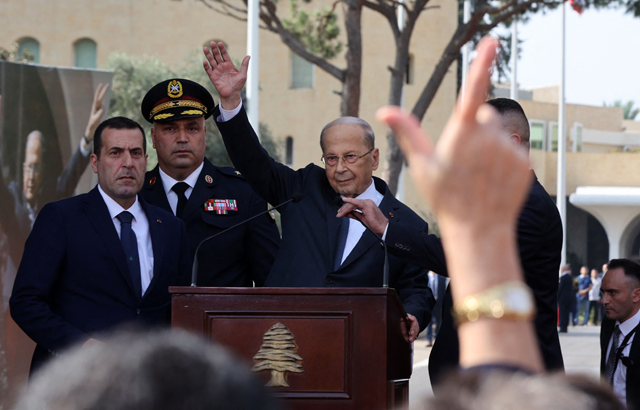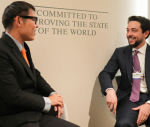You are here
Lebanon army chief Aoun becomes president after two-year void
By AFP - Jan 09,2025 - Last updated at Jan 09,2025

This handout photo released by the Lebanese parliament shows Newly elected Lebanese president Joseph Aoun (L) standing next to the parliament speaker Nabih Berri as he delivers a speech during a parliamentary session to elect a president, in Beirut, on January 9, 2025 (AFP photo)
Beirut, Lebanon — Lebanon's lawmakers on Thursday elected army chief Joseph Aoun as president after a two-year vacancy in the position, in a step towards lifting the war-battered country out of financial crisis.
Aoun, who turns 61 on Friday, arrived inside parliament to swear his oath to general applause, wearing a dark suit and blue tie instead of his usual military uniform.
"Today, a new phase in Lebanon's history begins," he told the chamber.
Aoun faces the daunting tasks of overseeing a ceasefire in south Lebanon and naming a prime minister able to lead reforms demanded by international creditors to save the country from its worst economic crisis in history.
He said he would call for parliamentary consultations as soon as possible on naming a new prime minister.
He vowed that the state would have "a monopoly" on arms after a devastating war this autumn between Israel and Shiite militant group Hizbollah.
"I pledge to call for discussing a comprehensive defence strategy... on the diplomatic, economic and military levels that will enable the Lebanese state -- I repeat, the Lebanese state -- to remove the Israeli occupation and deter its aggression," he added.
Supporters erupted in celebration in Aoun's home village of Aishiyeh in south Lebanon, where residents had gathered from the morning in front of a church adorned with Lebanese flags and his portrait, an AFP reporter said.
"The president is Joseph Aoun," parliament speaker Nabih Berri said after 99 lawmakers out of 128 backed his candidacy.
'Unite the country'
Aoun is Lebanon's fifth army commander to become president, and the fourth in a row.
Under multi-confessional Lebanon's power-sharing system, the president must be a Maronite Christian, as do military chiefs.
The president's powers have been reduced since the end of the 1975-1990 civil war.
But filling the position is key to overseeing consultations towards naming a new prime minister.
The Mediterranean country has been without a president since the term of Michel Aoun -- unrelated to his successor -- ended in October 2022.
Critics have accused Hizbollah and allies of scuppering previous votes.
The war between Israel and Hizbollah that ended in late November dealt heavy blows to the group, including the loss of its longtime leader Hassan Nasrallah in an Israeli air strike.
In neighbouring Syria, Hizbollah has lost a major ally after rebels toppled president Bashar Al Assad last month.
Israel's Foreign Minister Gideon Saar said he hoped his election would "contribute towards stability".
Iran's embassy in Beirut congratulated Aoun on his win, saying it looked forward to working together to serve "common interests".
The US embassy in Beirut said Washington was "committed to working closely with President Aoun as he begins his efforts to unite the country, implement reforms and secure a prosperous future for Lebanon".
Aoun was widely seen as the preferred pick of army backer the United States, as well as regional heavyweight Saudi Arabia.
UN special coordinator for Lebanon, Jeanine Hennis-Plasschaert, welcomed the election "as a long-awaited first step towards overcoming Lebanon's political and institutional vacuum".
"A prime minister must be designated and a government formed without delay," she said.
'Sovereignty and the constitution'
International pressure had mounted ahead of the vote, with just 17 days remaining in a ceasefire to deploy Lebanese troops alongside UN peacekeepers in south Lebanon after Israeli troops withdraw.
But lawmakers from the pro-Hizbollah bloc voted blank in the first round of the vote on Thursday morning, a source close to them said, leaving army chief Aoun short of the required two-thirds majority to win outright.
The source said representatives from the bloc met Aoun before lawmakers returned for a second vote.
US, Saudi and French envoys have visited Beirut to increase pressure in the run-up to the vote.
France's envoy to Lebanon Jean-Yves Le Drian attended the vote.
Several lawmakers in the second round still objected to what they saw as foreign interference in the vote.
In protest, some rendered their ballot void by voting for "sovereignty and the constitution", a reference to the fact that Aoun's election would have technically required a constitutional amendment.
Under Lebanon's constitution, any presidential candidate must have not held high office for at least two years.
During the second round, one lawmaker chose former US presidential candidate Bernie Sanders.
Related Articles
BEIRUT, Lebanon — Lebanese political heavyweights held talks Wednesday a day ahead of a parliamentary session to elect a president, but even
BEIRUT — Lebanese lawmakers ended a two-year political vacuum on Monday by electing as president ex-army chief Michel Aoun, who promised to
BAABDA, Lebanon — Lebanon's outgoing head of state, Michel Aoun, left the presidential palace on Sunday, a day before his mandate expires wi


















